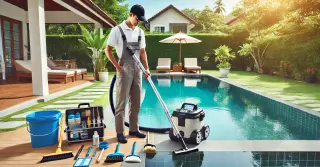Residential Pool Maintenance Ahsahka ID

Proper residential pool maintenance requires routine cleaning and debris control. Maintaining a clean pool free from debris is essential for both aesthetics and health.
- Surface Skimming and Pool Vacuuming: Routine skimming and vacuuming are important activities for maintaining a clean pool. Use a pool skimmer to remove floating debris such as leaves and bugs, and vacuum the pool’s floor to remove dirt and sediment. This helps maintain water clarity and inhibits algae and bacteria.
- Cleaning Pool Walls and Tiles: Remember to clean the pool walls and tiles regularly. Brushing the walls and scrubbing the tiles prevents algae, calcium, and residue buildup. Use a brush suitable for your pool’s surface, whether it’s plaster, fiberglass, or vinyl, to prevent damage. Consistent cleaning keeps your pool pristine and extends its lifespan.
Maintaining Pool Water BalanceMaintaining proper water balance is crucial for the safety and comfort of swimmers. Proper chemical levels stop algae, bacteria, and other contaminants, while protecting your pool’s structure and components.
- Testing and Adjusting Chemical Levels: Regularly test your pool water to monitor chemical levels, including pH, chlorine, alkalinity, and calcium hardness. Use a reliable pool test kit to get accurate readings. Adjust the chemical levels as needed to maintain balance. Properly balanced water prevents corrosion, scaling, and cloudiness, providing a safe and enjoyable swim.
- Safe Pool Chemical Handling: When adding chemicals to your pool, always follow manufacturer guidelines and use proper safety equipment, such as gloves and safety glasses. Add chemicals in the right order, and do not mix them directly, as this can cause dangerous reactions. Store chemicals in a cool, dry location, out of reach of children and pets. Using pool chemicals safely ensures safety for all and keeps your pool water pristine.
Consistent Equipment Checks and UpkeepRoutine inspection and upkeep of pool equipment are vital for smooth pool operation. This includes pumps, filters, heaters, and chlorinators, which are all key components in maintaining a clean and functional pool.
- Checking and Cleaning the Pool Pump and Filter: Consistently monitor your pool pump and filter to ensure proper function. Clean or change filter cartridges as required to keep filtration effective. A well-maintained pump and filter keep water clear and free of impurities, reducing the burden on chemical treatments.
- Checking Heaters and Chlorinators: Verify that your pool heater and chlorinator are working properly. Inspect for any wear and tear, such as leaks, rust, or faulty parts. Regular maintenance and timely repairs can avoid costly repairs and extend the life of your equipment. An efficient heater guarantees comfortable water temperatures, while a working chlorinator keeps the water clean.
Residential pool maintenance requires regular cleaning, water balance, and equipment care. By following these guidelines, you can maintain a safe, clean, and enjoyable pool all season long.




